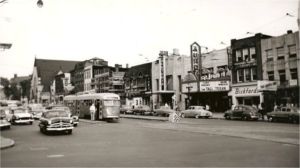NTCIC announces the closing of $1.7 million in New Markets Tax Credit allocation for the historic Odell’s building in Baltimore, MD. The redevelopment efforts will reactivate the 18,000 square foot landmark that was once home to a dance academy with royal ties, as well as the famous Odell’s nightclub. It will continue the growth of Baltimore’s Arts District and become the North Avenue Educational Hub, a new home to two local nonprofit organizations dedicated to enriching the lives of students, Young Audiences of Maryland and Code in the Schools. This is the 9th project to be supported through NTCIC’s Irvin Henderson Main Street Revitalization Fund.
“We are excited to continue our support of the revitalization efforts in the Station North Arts District,” said NTCIC Acquisitions Manager Amanda Bloomberg. “Reactivating a historic landmark and creating space for such impactful organizations is a perfect fit for the Main Street Revitalization Fund.”
A New Home for Local Nonprofits
Young Audiences of Maryland is a state leader in connecting and engaging students in learning through the arts. For 70 years, the organization has connected students from pre-K to grade 12 with hundreds of artists to engage in hours of discovery, inspiration, and hands-on learning and engagement. They will be occupying the first and lower floors, allowing them to support the administration of their programming and to host professional development for teachers and school administrators.
Relocating their headquarters to the second-floor space of the building, Code in the Schools is a local nonprofit organization that empowers Baltimore City youth to thrive in the 21st-century economy by expanding access to quality computer science education and building pathways from school to jobs and higher education.

Baltimore Cultural Landmark
Built in 1909, the building at 21 North Avenue was one of the first, if not the first, commercial spaces located on what is now known as North Avenue, a very wealthy area at the time. The building’s first tenants included a luxury Buick sales and service station and a ballroom dance academy that instructed generations of Baltimore’s upper-class, including Wallis Simpson, the Duchess of Windsor.
From the 1950s through the building’s vacancy in 1992, it housed several famous nightclubs and venues, including the iconic Odell’s. Opened in 1976, Odell’s was Baltimore’s premier disco venue through the 1980s and a cultural landmark for the city’s Black community. It is often cited as the birthplace of Baltimore Club Music. After its closing in 1992, the building sat vacant, waiting for revitalization.
Community Development through Historic Preservation
The revitalization of the historic building, spearheaded by the nonprofit development group Jubilee Baltimore, will create a new home for creating positive community outcomes from the moment the first brick is laid. The construction team estimates the project will create 57 full-time equivalent (FTE) jobs, all paying the Maryland Prevailing Wage (or higher), and will be working with Project Jumpstart to provide employment and training opportunities for Baltimore residents.
Once complete, the expanded space and lower rents will enable both organizations to hire additional employees, expand their training programs and help more children of Baltimore. In total, the project will create and retain 62 permanent jobs, all of which will pay a living wage (or higher), and provide healthcare, paid leave, retirement benefits, job training, and opportunities for advancement. The large space for Code in the Schools will help up to 50 students gain access to computer science education courses on-site every day during the school year.
Another Main Street Revitalization
The $6.7 million project was financed in part with New Markets Tax Credits provided by NTCIC’s Irvin Henderson Main Street Revitalization Fund, which supports historic revitalization efforts in our country’s underinvested Main Street communities. Project financing also includes state and federal Historic Tax Credit equity. The North Avenue Educational Hub will see its new tenants by the end of 2020.
To learn more about the history of the building and the development efforts, click here.